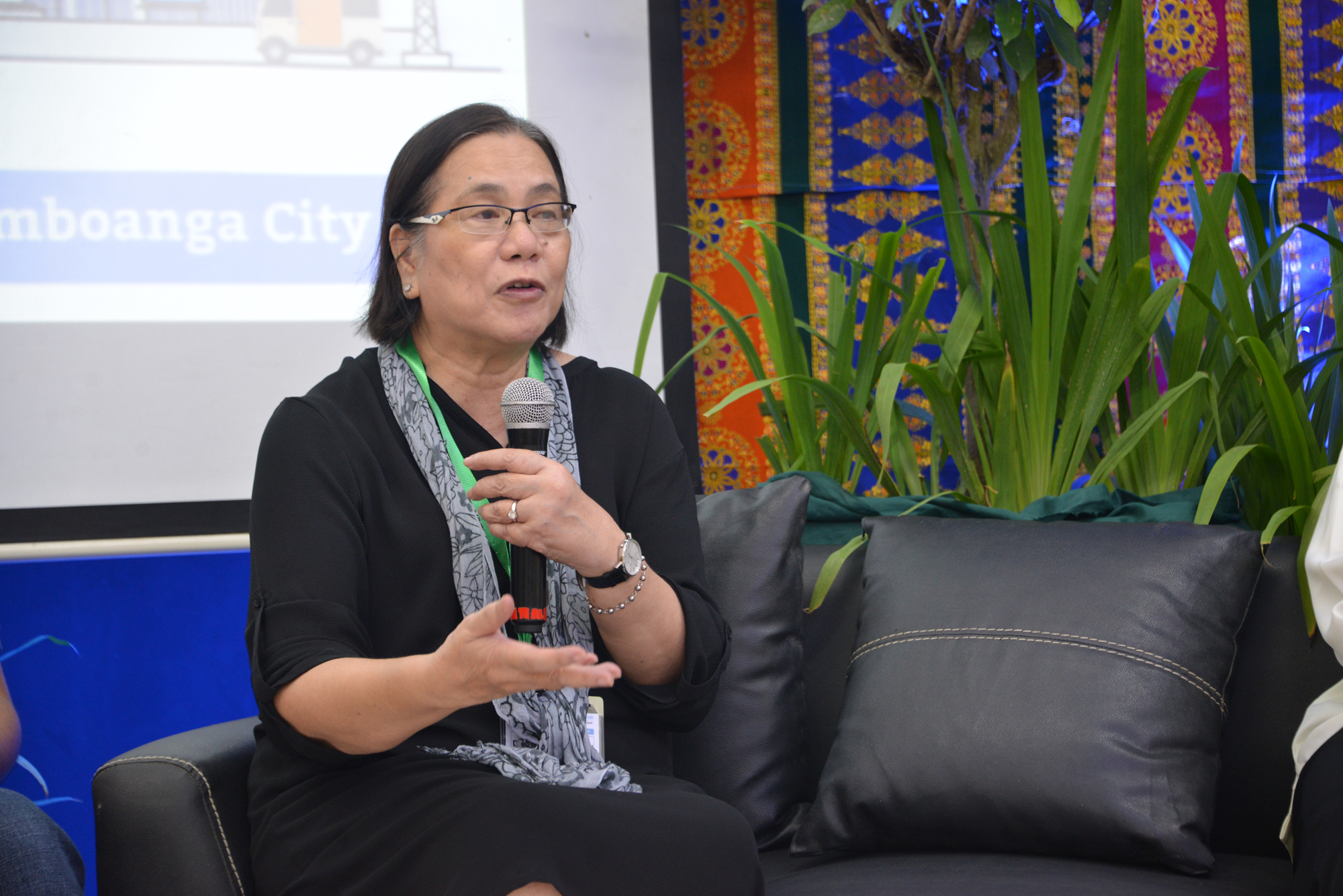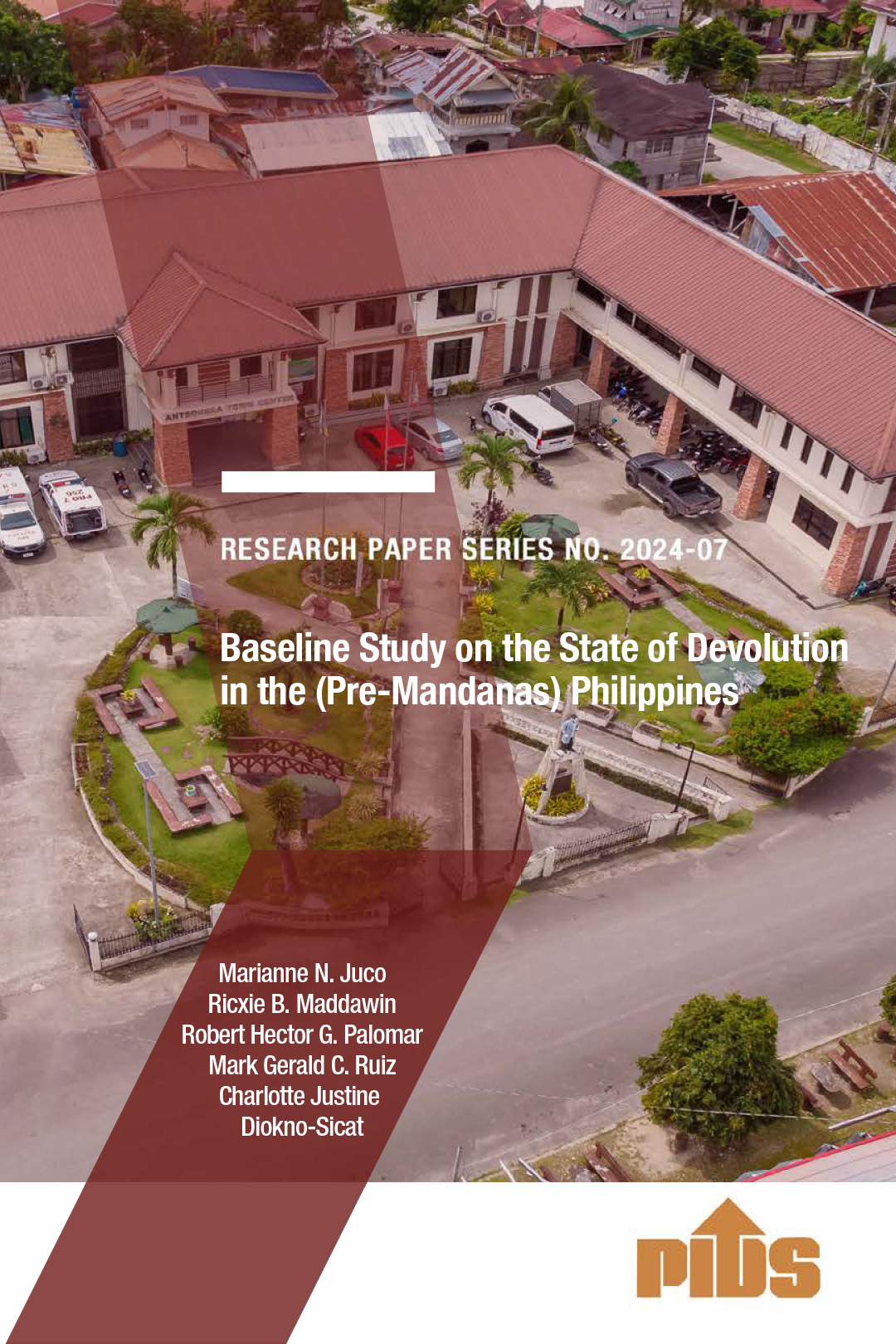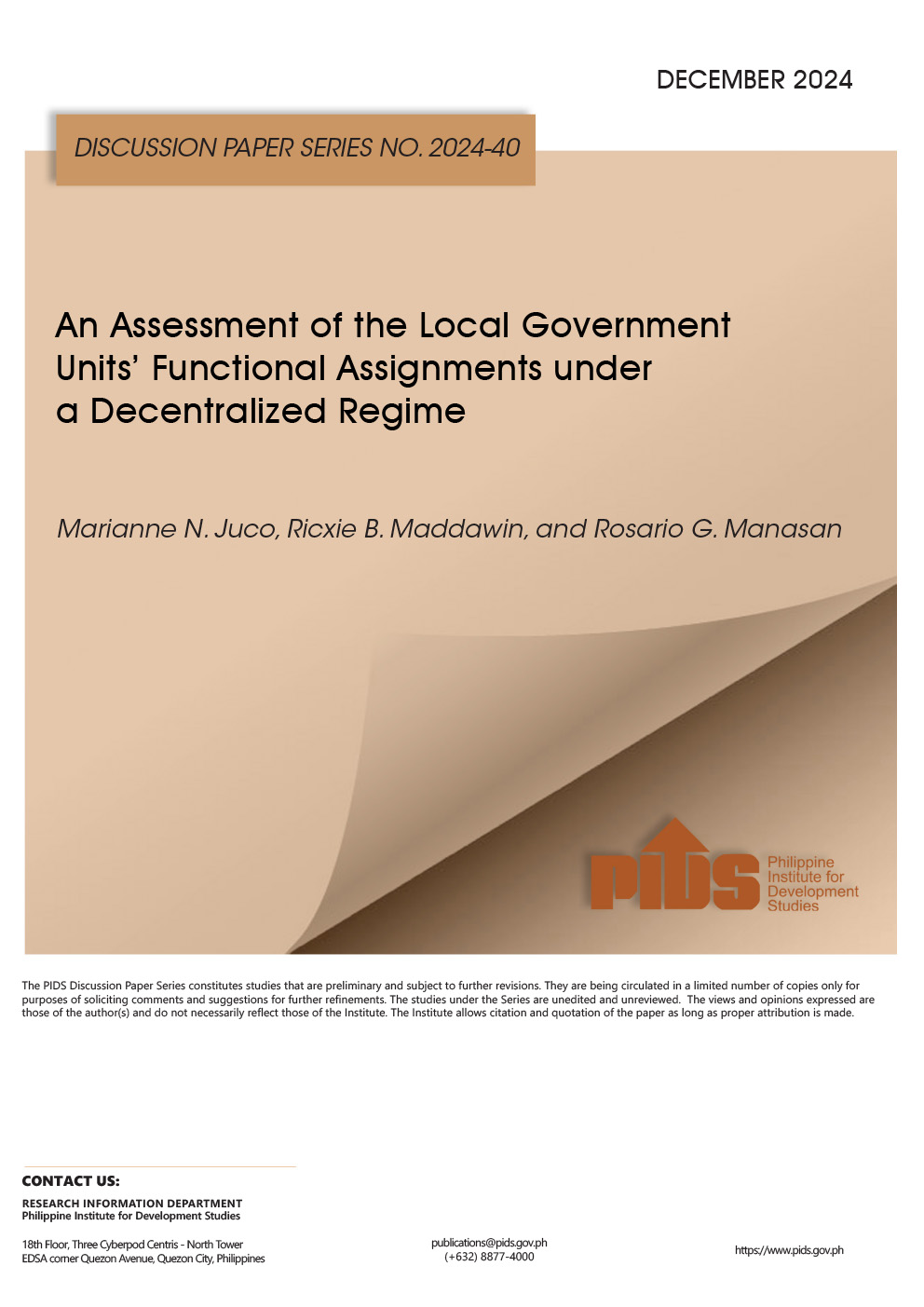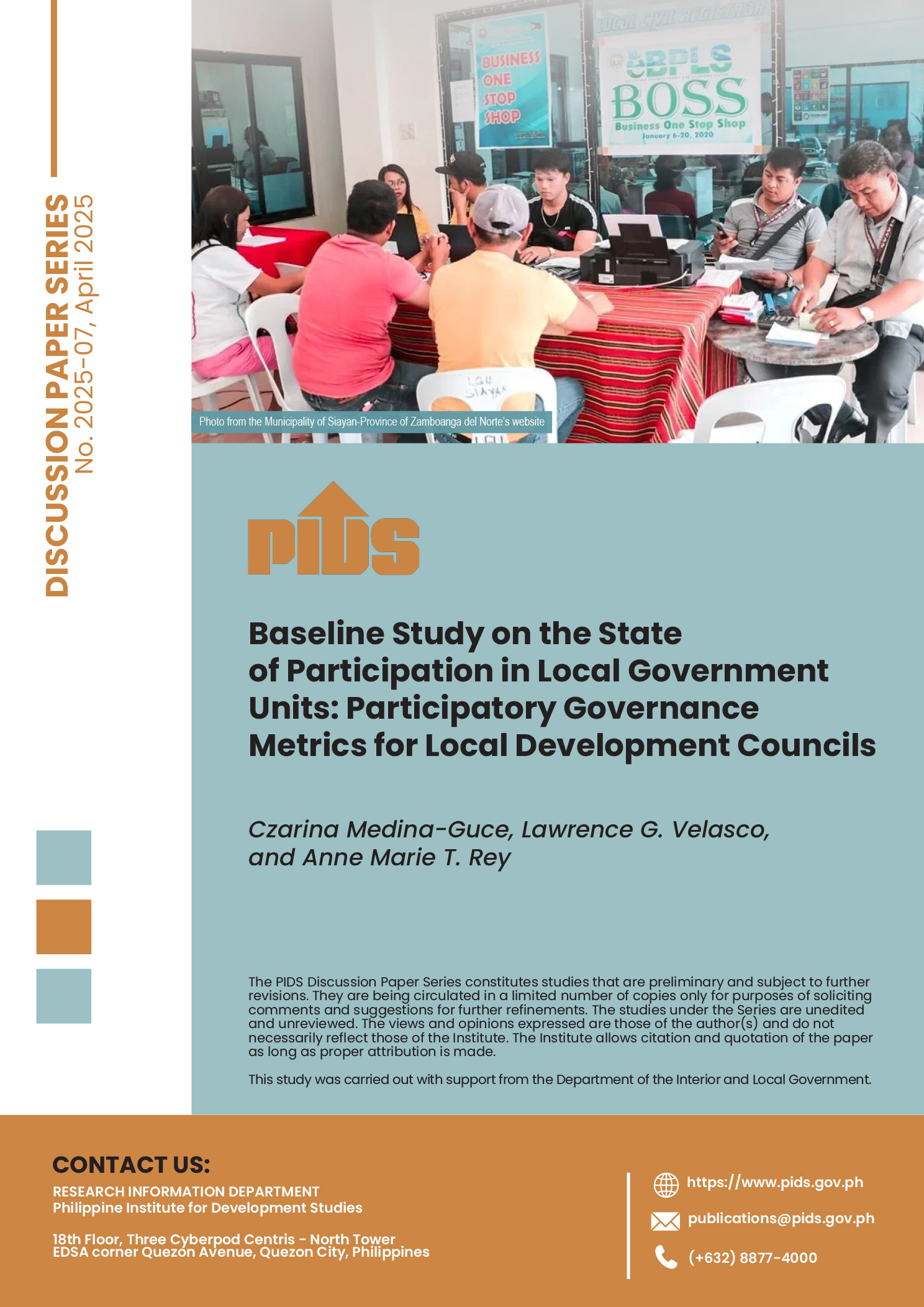
The Philippine Institute for Development Studies (PIDS), in collaboration with the Mindanao Development Authority (MinDA) and Ateneo de Zamboanga University (AdZU), held a federalism research forum in Zamboanga City on September 7.
The event, which carries the theme “Federalism as Policy Option for a Decentralized Inclusive Development: A Critical Inquiry”, is the first policy forum lined up for the 15th Development Policy Research Month (DPRM), an annual celebration led by PIDS every September to promote the importance of evidence-based policy research in program planning and policymaking.
Fiscal impacts of federalism
At the forum, Dr. Rosario Manasan, PIDS’ public finance expert, presented the findings of her study on the possible fiscal impacts of shifting to a federal form of government.
Manasan discussed the importance of properly allocating financial resources to each level of government under a federal system. According to her, the distribution of fiscal resources may either enable or constrain governments in the exercise of their constitutionally assigned legislative and executive responsibilities. She noted that taxing powers and expenditures are important instruments for regulating the economy.
The PIDS senior research fellow underscored that each level of government must have enough revenues to finance basic services for the public.
In a federal system, taxing and spending powers are decentralized to state/regional governments, which give them a free hand to decide how and where to use their budgets. With this setup, Manasan said, they will be able to spend their funds on projects and policies that are responsive to the needs of their localities without seeking approval from the national or federal government.
Citing some practices in the sharing of taxing powers in federal states, Manasan pointed out that customs and excise taxes are assigned most of the time to the federal or national government. The same goes with corporate taxes. However, in some federations, these may be under the concurrent jurisdiction of federal and state/regional governments.
For personal income tax (PIT), Manasan said this may be more directly attributed to the location of residence and, therefore, more appropriate to be assigned to state/regional governments. But in the case of Austria and India, the PIT has been exclusively under the federal or national government.
Sales or consumption taxes are shared by both federal and state/regional governments, she added.
Furthermore, Manasan raised the possibility that some local government units may not be ready for the shift to federalism especially in terms of development and financial stability.
To address the risks of greater disparities under a more decentralized form of government, Manasan said policymakers must design a feasible intergovernmental transfer, which could be in the form of tax shares, unconditional block grants, or specific purpose conditional grants to assist poorer states or regions.
She said, this can also be through equalization arrangements, which are administered by the federal or national government to help poorer states similar to the current practice in Germany, Canada, and Switzerland.
Limited taxing and revenue powers of local governments
However, Romulo Emmanuel M. Miral Jr., director-general of the Congressional Policy and Budget Research Department, clarified that the objective of equalization transfer systems is not to provide uniform services or even produce economic growth but to ensure that all individuals, regardless of their place of residence, are entitled to a prescribed standard of government service.
He also said that one of the weaknesses of decentralization in the country is the failure of the national government to commensurately decentralize control over public finances and/or revenue-raising powers to subnational levels.
“Planning and administration were decentralized to the regions, but budgeting decisions remained largely with the central offices of national government agencies,” he explained.
According to Miral, the Philippines has the highest number and the smallest sizes of first-tier subnational government in East Asia.
“The provinces and cities, which are currently the first-tier subnational governments, are too small to absorb many of the expenditure functions and revenue-raising powers of the national government. Thus, the proposal for a federal form of government, which provides the creation of bigger subnational, such as regional government, makes sense,” he posited.
Explaining further, Miral said assigning national government’s expenditure functions and revenue-raising powers to regional states could breakup and reduce the size of the common resource pool, referring to collected taxes nationwide, including proceeds from government borrowings that are used to finance government services.
“At the regional level, the size of the common resource pool as well as the number of claimants will be smaller, rendering the incidence of costs of and benefits from government spending more visible, thus, promoting greater vigilance and accountability,” he concluded.
Features of the proposed federal form of gov’t
Meanwhile, Jonathan Malaya, executive director of the PDP Laban Federalism Institute, revealed that the Duterte administration is considering a semi-presidential system of government and not a unicameral legislature.
Malaya said this type of a ‘hybrid parliamentary system’ will have a president and a prime minister.
“The president will be the head of state while the prime minister will be the head of government,” he said, adding that, “the president will be in-charge of foreign affairs and national defense while the prime minister will run the day-to-day affairs of the government.”
Moreover, Malaya said the president will be elected nationally with a term limit of five years while the prime minister will be nominated with the consent of the federal assembly who is appointed by the president. The prime minister, he disclosed, may be removed any time with the vote of ‘no confidence’ from the assembly.
Three senators who will serve for five years will be elected per region. According to Malaya, the senate cannot initiate laws as this will be lodged to the federal assembly. He also explained that there will only be one reading of bills instead of three, which is the current practice in both lower and upper houses.
Federalism: Will it end strife in Mindanao?
In the same forum, Secretary Datu Abul Hj. Khayr Alonto of MinDA recommended the immediate adoption of federalism to resolve the conflict in Mindanao.
“Having witnessed and endured the turbulent years of strife in Mindanao along with my fellow brothers and sisters, I have come to realize that the only way to permanently put the regime of fragmentation and violence in Mindanao to rest is to pursue initiatives that will transcend beyond any affiliation or interest,” he said.
Alonto said Mindanaoans favor federalism over decentralization because “anything delegated can be withdrawn but anything shared cannot be dismantled."
“Mindanao is ready for federalism and we can do it, we will do it,” Alonto declared.
The MinDA chief also said that the shift to federalism will be a great opportunity to highlight the Bangsamoro agenda.
“As chairman of MinDA and as a Bangsamoro, I can assure you that we are not going to stop until we get everyone on board in this undertaking. Every person, every voice, every opinion merits of great importance in establishing a state that values unity and empathy over divisiveness and indifference,” Alonto explained.
On the other hand, Atty. Kenneth Beldua, who represented Zamboanga City Mayor Maria Isabelle Climaco, underscored the importance of probing deeper into the proposed change in government system to “avoid the mistakes and pitfalls in older federations".
“In borrowing concept and ideas from federal countries, we would like to understand the guiding principles so that we can properly adopt them and even adapt them to local conditions to meet our specific needs,” he pointed out.
Beldua added that the present administration has to make sure that the people are satisfied with the division of responsibilities that will be included in the amendment of the Constitution. He also cautioned against building a federalist country that alienates certain states or leaves them behind. ###
The event, which carries the theme “Federalism as Policy Option for a Decentralized Inclusive Development: A Critical Inquiry”, is the first policy forum lined up for the 15th Development Policy Research Month (DPRM), an annual celebration led by PIDS every September to promote the importance of evidence-based policy research in program planning and policymaking.
Fiscal impacts of federalism
At the forum, Dr. Rosario Manasan, PIDS’ public finance expert, presented the findings of her study on the possible fiscal impacts of shifting to a federal form of government.
Manasan discussed the importance of properly allocating financial resources to each level of government under a federal system. According to her, the distribution of fiscal resources may either enable or constrain governments in the exercise of their constitutionally assigned legislative and executive responsibilities. She noted that taxing powers and expenditures are important instruments for regulating the economy.
The PIDS senior research fellow underscored that each level of government must have enough revenues to finance basic services for the public.
In a federal system, taxing and spending powers are decentralized to state/regional governments, which give them a free hand to decide how and where to use their budgets. With this setup, Manasan said, they will be able to spend their funds on projects and policies that are responsive to the needs of their localities without seeking approval from the national or federal government.
Citing some practices in the sharing of taxing powers in federal states, Manasan pointed out that customs and excise taxes are assigned most of the time to the federal or national government. The same goes with corporate taxes. However, in some federations, these may be under the concurrent jurisdiction of federal and state/regional governments.
For personal income tax (PIT), Manasan said this may be more directly attributed to the location of residence and, therefore, more appropriate to be assigned to state/regional governments. But in the case of Austria and India, the PIT has been exclusively under the federal or national government.
Sales or consumption taxes are shared by both federal and state/regional governments, she added.
Furthermore, Manasan raised the possibility that some local government units may not be ready for the shift to federalism especially in terms of development and financial stability.
To address the risks of greater disparities under a more decentralized form of government, Manasan said policymakers must design a feasible intergovernmental transfer, which could be in the form of tax shares, unconditional block grants, or specific purpose conditional grants to assist poorer states or regions.
She said, this can also be through equalization arrangements, which are administered by the federal or national government to help poorer states similar to the current practice in Germany, Canada, and Switzerland.
Limited taxing and revenue powers of local governments
However, Romulo Emmanuel M. Miral Jr., director-general of the Congressional Policy and Budget Research Department, clarified that the objective of equalization transfer systems is not to provide uniform services or even produce economic growth but to ensure that all individuals, regardless of their place of residence, are entitled to a prescribed standard of government service.
He also said that one of the weaknesses of decentralization in the country is the failure of the national government to commensurately decentralize control over public finances and/or revenue-raising powers to subnational levels.
“Planning and administration were decentralized to the regions, but budgeting decisions remained largely with the central offices of national government agencies,” he explained.
According to Miral, the Philippines has the highest number and the smallest sizes of first-tier subnational government in East Asia.
“The provinces and cities, which are currently the first-tier subnational governments, are too small to absorb many of the expenditure functions and revenue-raising powers of the national government. Thus, the proposal for a federal form of government, which provides the creation of bigger subnational, such as regional government, makes sense,” he posited.
Explaining further, Miral said assigning national government’s expenditure functions and revenue-raising powers to regional states could breakup and reduce the size of the common resource pool, referring to collected taxes nationwide, including proceeds from government borrowings that are used to finance government services.
“At the regional level, the size of the common resource pool as well as the number of claimants will be smaller, rendering the incidence of costs of and benefits from government spending more visible, thus, promoting greater vigilance and accountability,” he concluded.
Features of the proposed federal form of gov’t
Meanwhile, Jonathan Malaya, executive director of the PDP Laban Federalism Institute, revealed that the Duterte administration is considering a semi-presidential system of government and not a unicameral legislature.
Malaya said this type of a ‘hybrid parliamentary system’ will have a president and a prime minister.
“The president will be the head of state while the prime minister will be the head of government,” he said, adding that, “the president will be in-charge of foreign affairs and national defense while the prime minister will run the day-to-day affairs of the government.”
Moreover, Malaya said the president will be elected nationally with a term limit of five years while the prime minister will be nominated with the consent of the federal assembly who is appointed by the president. The prime minister, he disclosed, may be removed any time with the vote of ‘no confidence’ from the assembly.
Three senators who will serve for five years will be elected per region. According to Malaya, the senate cannot initiate laws as this will be lodged to the federal assembly. He also explained that there will only be one reading of bills instead of three, which is the current practice in both lower and upper houses.
Federalism: Will it end strife in Mindanao?
In the same forum, Secretary Datu Abul Hj. Khayr Alonto of MinDA recommended the immediate adoption of federalism to resolve the conflict in Mindanao.
“Having witnessed and endured the turbulent years of strife in Mindanao along with my fellow brothers and sisters, I have come to realize that the only way to permanently put the regime of fragmentation and violence in Mindanao to rest is to pursue initiatives that will transcend beyond any affiliation or interest,” he said.
Alonto said Mindanaoans favor federalism over decentralization because “anything delegated can be withdrawn but anything shared cannot be dismantled."
“Mindanao is ready for federalism and we can do it, we will do it,” Alonto declared.
The MinDA chief also said that the shift to federalism will be a great opportunity to highlight the Bangsamoro agenda.
“As chairman of MinDA and as a Bangsamoro, I can assure you that we are not going to stop until we get everyone on board in this undertaking. Every person, every voice, every opinion merits of great importance in establishing a state that values unity and empathy over divisiveness and indifference,” Alonto explained.
On the other hand, Atty. Kenneth Beldua, who represented Zamboanga City Mayor Maria Isabelle Climaco, underscored the importance of probing deeper into the proposed change in government system to “avoid the mistakes and pitfalls in older federations".
“In borrowing concept and ideas from federal countries, we would like to understand the guiding principles so that we can properly adopt them and even adapt them to local conditions to meet our specific needs,” he pointed out.
Beldua added that the present administration has to make sure that the people are satisfied with the division of responsibilities that will be included in the amendment of the Constitution. He also cautioned against building a federalist country that alienates certain states or leaves them behind. ###












